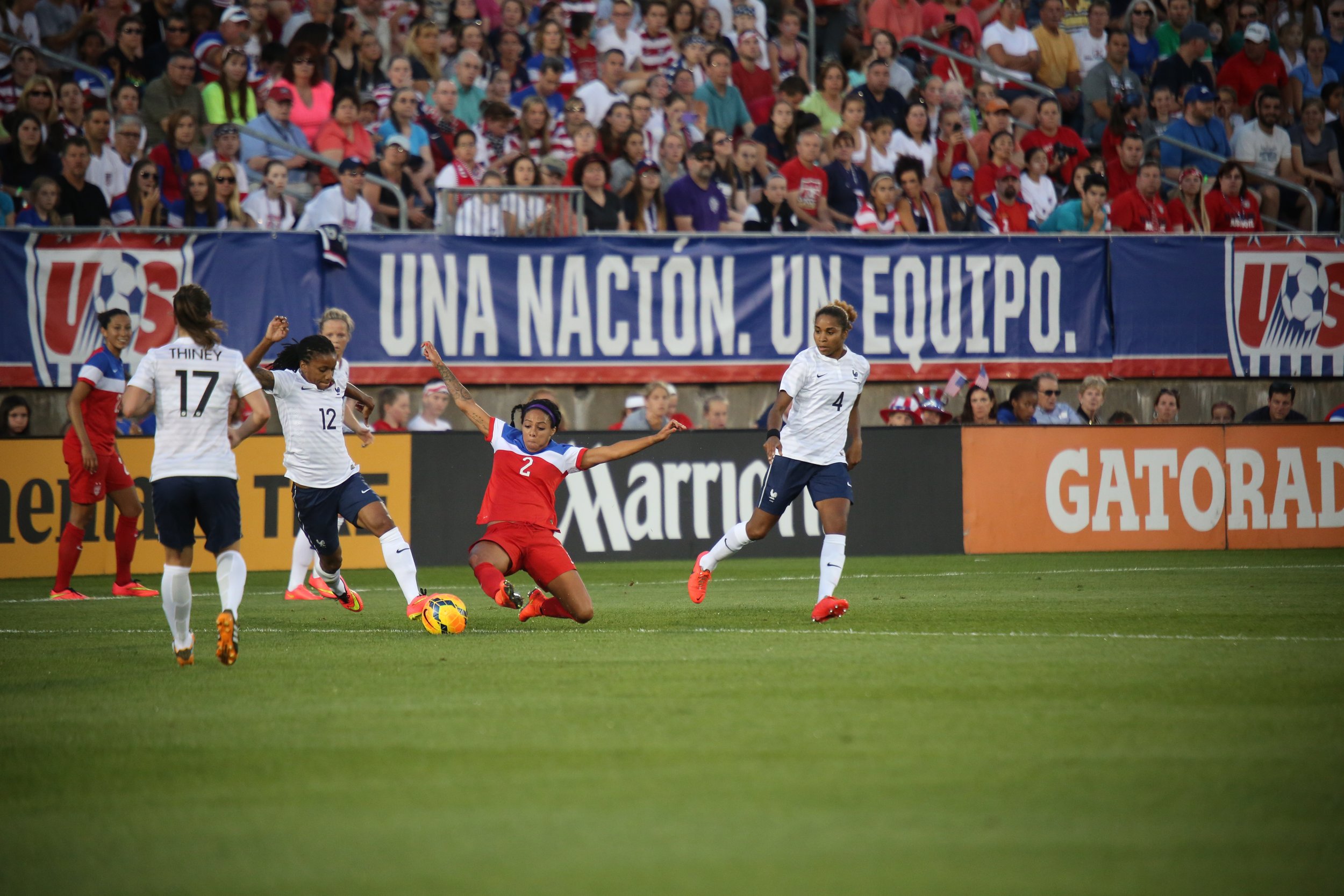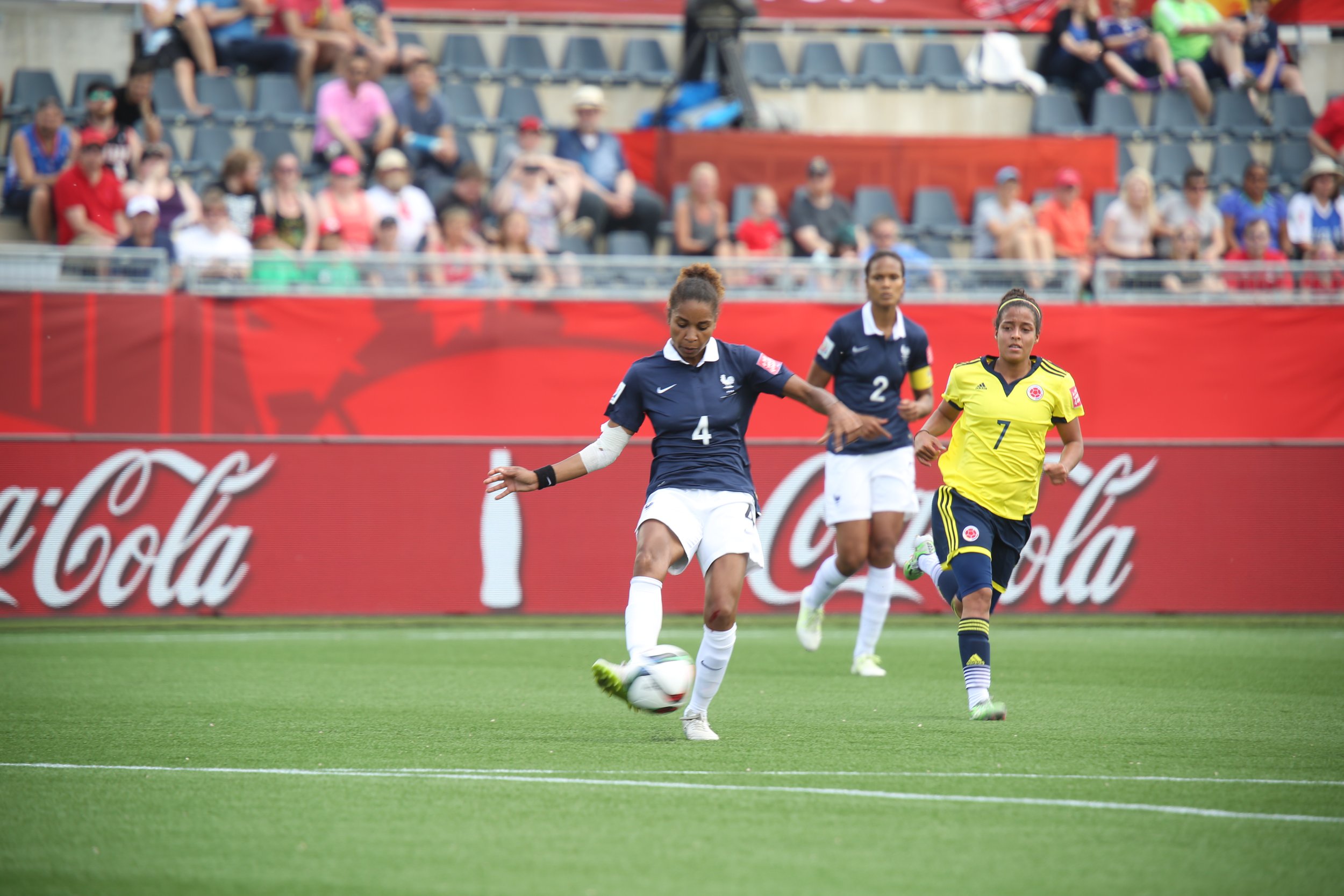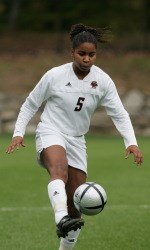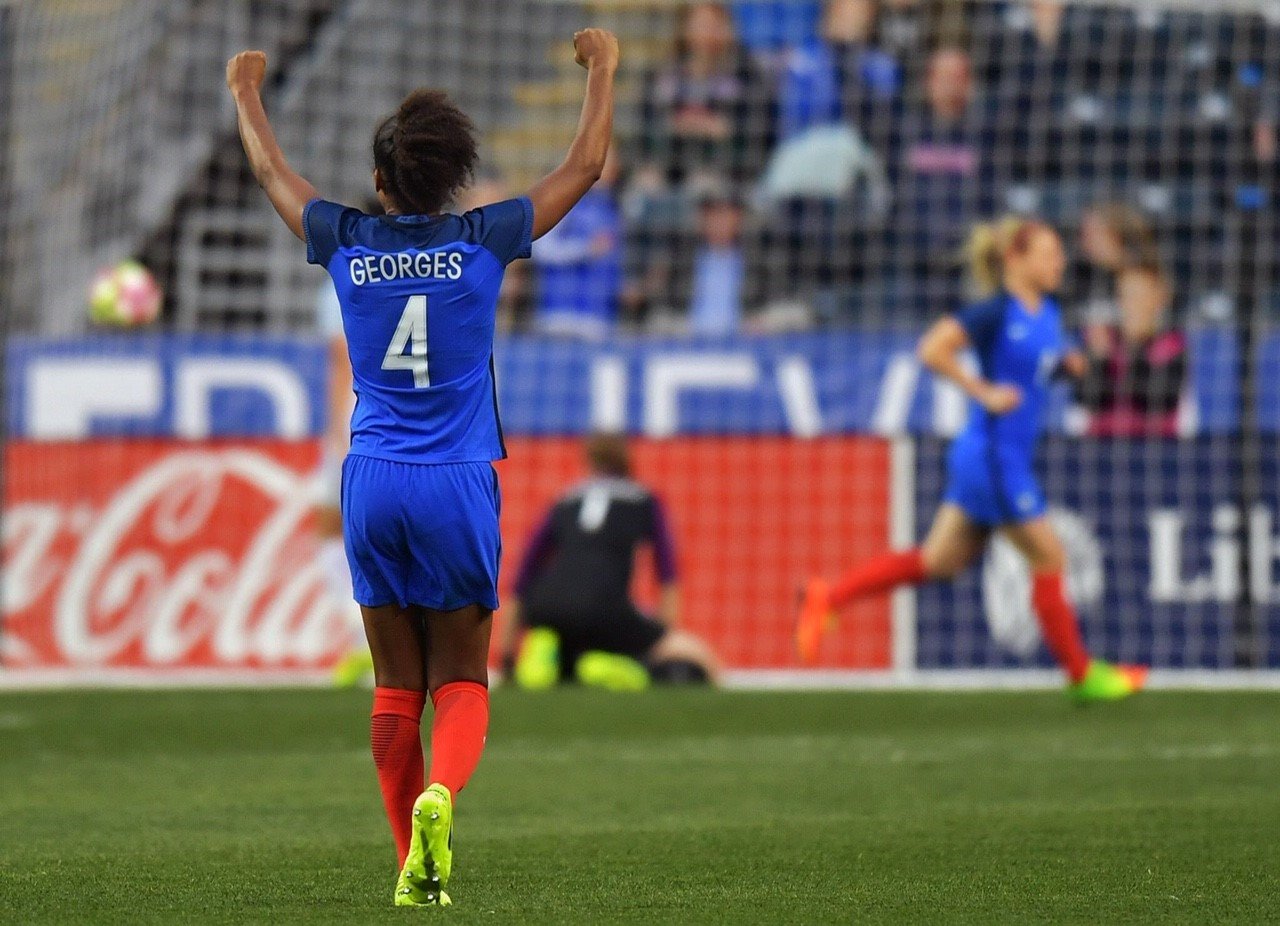⚽️0️⃣2️⃣3️⃣ Laura Georges
Laura Georges. Photo: FFF.
Meet Laura Georges, Secretary-General of the French Football Federation (FFF) and former international and professional footballer who was one of the first French women to play NCAA D1 football in 2004.
Born August 20, 1984 in Le Chesnay, Georges grew up in Versailles playing football with neighbors and friends in the local parks. At age 12, she joined the Paris Saint-Germain youth squad. Georges’ skills attracted attention, and she was recruited to the National Football Institute (INF) at Clairefontaine, part of the first generation to matriculate through the newly-founded girls’ program–a legacy of hosting the 1998 FIFA World Cup. Clairefontaine was a game-changer for Georges: she received top-flight training while finishing school; she met one of her role models, Lilan Thuram; and, thanks to roommate Zoe Avner, who left to play for Rutgers University in New Jersey, Georges began to consider playing while pursuing a university degree in the United States.
Laura’s Story
The idea moved closer to becoming reality when the Boston College women’s team visited Paris during their spring break in 2003. Georges played a match against them and impressed the American coaches. “At the end of the game, they asked me if I wanted to study and play in the U.S.,” she recalled. “ I said, why not?”
Holding the backline for the Boston College Eagles. Photo: Laura Georges.
That’s how Georges arrived in Chestnut Hill, Massachusetts, to begin her sophomore year with the BC Eagles in 2004. At first, there were a few growing pains. “I struggled to understand what my coach was saying on the field, and the way they expected me to play,” she recalled. Georges also encountered different attitudes to sports medicine; back home an injury was treated by a physiotherapist, who would massage the muscles as part of a fuller diagnostic treatment. “In the United States, you have ice,” she said. “Whenever I was injured, they would give me ice.”
The marketing major quickly found a home on the pitch; she played in 13 games and started in nine that first season, which launched a sterling BC Hall of Fame career. (Today, Georges is one of BC’s 25 all-time greatest athletes). The 2005 and 2006 All-ACC first team and Soccer Buzz Magazine Northeast Player of the Year was a dominant force for the Eagles’ backline. But she marveled at how her American teammates didn’t really follow the game professionally or at the elite level overseas.
“Some of them know about Zidane, some of them didn’t know about Zidane. They were playing football because they love it, not because they were interested in the game. There were so many players who played the game but who didn’t watch men’s or women’s football.”
The Sports Diplomacy Connection
(Above) Yes! Photo: Laura Georges. (Below) Georges in a June 20, 2014 friendly against the United States; at the FIFA World Cup 2015 against Colombia. Photos: FFF.
During her BC years, Georges continued to play with Les Bleues (her first call up to the senior team was for a September 2001 friendly against the Netherlands), and thus engaged in formal sports diplomacy while representing France on the field. Years later, she helped the team to a fourth-place finish at the 2012 London Olympic Games.
But back in Chestnut Hill, she engaged in informal sports diplomacy through the informal people-to-people cultural, technical, and knowledge exchanges she had with her teammates and classmates.


Georges brought an aggressiveness to the field, and worked to be a good teammate. “I wanted to have a smile, be a part of the team, and learn about their side,” she said.
She also brought an insider’s knowledge of her hometown, a source of curiosity among her teammates. “People say, ‘oh we love Paris!’ I didn’t really understand why they love Paris so much,” she confided. “But when I came back home, I was like ‘yeah, Paris is special.’”
“What I learned in the U.S. and my career in Boston was the team-building effect, how you play not just for yourself but how you’re part of a team with a spirit ,” she said. Preparing for games was a team endeavor.
“Players motivated each other, and every game was different because it was a different player presenting their ideas. It was really something special. I learned how to work as a team, to never give up because we’re a team, and to have good will toward other teammates.”
During this time, Georges met her future mentor, George Mumford; he had previously worked with Phil Jackson, Michael Jordan and Kobe Bryant and helped with her own breakthroughs. “I worked a lot on the person that I wanted to be, to improve mentally,” she recalled.
“I learned a lot about being more confident and being present in the moment. I grew not because I was training more [at BC], but I grew as a person and as a woman because I was more confident. This is what I learned from my BC experience.”
Even today, after hanging up her cleats as a professional and international player, Georges still engages in the acts of diplomacy (communication, negotiation, and representation). “I feel like a sports ambassador,” she said. “There is an opportunity to make the game grow. It's not just about a woman promoting the game for other women. It's a woman saying, ‘I have lived football as a professional player.’ I became the woman that I am thanks to football.”
Georges admits that she was shy as a kid. “I didn’t have much expectation for my professional career,” she said. But football was a game-changer. “I was a professional player, I got to study abroad. I could dream bigger. For me, it was an opportunity to grow as a woman.”
Laura Georges: "When I said I would play in a World Cup one day, I was laughed at." Watch on FIFA TV.
Mapping the Connection
From Versailles, France to Chestnut Hill, Massachusetts
Further Reading
[E] Interview with the author, May24, 2022
[E] Karoline Strauss, “A Conversation With Laura Georges on Gender Equality in Sport,” ESSEC Sports Chair.
[F] “Fiche: Laura Georges,” Fédération Française de Football (FFF).
[E] Lindsay Sarah Krasnoff, “The Up-Front Legacies of France 2019: Changing the Face of ‘le foot féminin,’” Sport in History. Vol. 39, 2019. Issue 4 Upfront and Onside: Women, Football, History and Heritage Special Edition Part 2.
[E] Lindsay Sarah Krasnoff, “France’s 2018 World Cup Title Will Again Help Women’s Soccer,” espnW, August 8, 2018.
[E] Lindsay Sarah Krasnoff, “French Women are Taking Over Soccer,” The New Yorker, June 20, 2015.
How to Cite This Entry
Krasnoff, Lindsay Sarah. “Voices: Laura Georges,” FranceAndUS, https://www.franceussports.com/voices/023-laura-georges. (date of consultation).





